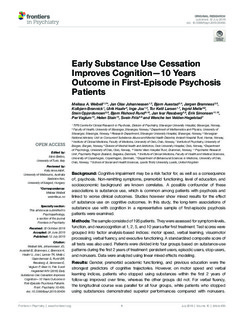| dc.contributor.author | Johannessen, Jan Olav | |
| dc.contributor.author | Auestad, Bjørn Henrik | |
| dc.contributor.author | Bramness, Jørgen Gustav | |
| dc.contributor.author | Brønnick, Kolbjørn Kallesten | |
| dc.contributor.author | Haahr, Ulrik | |
| dc.contributor.author | Joa, Inge | |
| dc.contributor.author | Larsen, Tor Ketil | |
| dc.contributor.author | Melle, Ingrid | |
| dc.contributor.author | Ilner, Stein E. Opjordsmoen | |
| dc.contributor.author | Rund, Bjørn Rishovd | |
| dc.contributor.author | Røssberg, Jan Ivar | |
| dc.contributor.author | Simonsen, Erik | |
| dc.contributor.author | Vaglum, Per | |
| dc.contributor.author | Stain, Helen J. | |
| dc.contributor.author | Friis, Svein | |
| dc.contributor.author | Hegelstad, Wenche | |
| dc.date.accessioned | 2020-02-21T09:55:44Z | |
| dc.date.available | 2020-02-21T09:55:44Z | |
| dc.date.created | 2019-08-27T10:53:43Z | |
| dc.date.issued | 2019-07 | |
| dc.identifier.citation | Weibell, M.A.E., Johannessen, J.O., Auestad, B. et al. (2019) Early substance use cessation improves cognition-10 years outcome in first-episode psychosis patients. Frontiers in Psychiatry, 10. | nb_NO |
| dc.identifier.issn | 1664-0640 | |
| dc.identifier.uri | http://hdl.handle.net/11250/2643175 | |
| dc.description.abstract | Background: Cognitive impairment may be a risk factor for, as well as a consequence of, psychosis. Non-remitting symptoms, premorbid functioning, level of education, and socioeconomic background are known correlates. A possible confounder of these associations is substance use, which is common among patients with psychosis and linked to worse clinical outcomes. Studies however show mixed results for the effect of substance use on cognitive outcomes. In this study, the long-term associations of substance use with cognition in a representative sample of first-episode psychosis patients were examined. Methods: The sample consisted of 195 patients. They were assessed for symptom levels, function, and neurocognition at 1, 2, 5, and 10 years after first treatment. Test scores were grouped into factor analysis-based indices: motor speed, verbal learning, visuomotor processing, verbal fluency, and executive functioning. A standardized composite score of all tests was also used. Patients were divided into four groups based on substance-use patterns during the first 2 years of treatment: persistent users, episodic users, stop-users, and nonusers. Data were analyzed using linear mixed effects modeling. Results: Gender, premorbid academic functioning, and previous education were the strongest predictors of cognitive trajectories. However, on motor speed and verbal learning indices, patients who stopped using substances within the first 2 years of follow-up improved over time, whereas the other groups did not. For verbal fluency, the longitudinal course was parallel for all four groups, while patients who stopped using substances demonstrated superior performances compared with nonusers. Persistent users demonstrated impaired visuomotor processing speed compared with nonusers. Within the stop- and episodic use groups, patients with narrow schizophrenia diagnoses performed worse compared with patients with other diagnoses on verbal learning and on the overall composite neurocognitive index. Discussion: This study is one of very few long-term studies on cognitive impairments in first-episode psychosis focusing explicitly on substance use. Early cessation of substance use was associated with less cognitive impairment and some improvement over time on some cognitive measures, indicating a milder illness course and superior cognitive reserves to draw from in recovering from psychosis. | nb_NO |
| dc.language.iso | eng | nb_NO |
| dc.publisher | Frontiers Media S.A. | nb_NO |
| dc.relation.uri | http://hdl.handle.net/11250/2633575 | |
| dc.rights | Navngivelse 4.0 Internasjonal | * |
| dc.rights.uri | http://creativecommons.org/licenses/by/4.0/deed.no | * |
| dc.subject | psykose | nb_NO |
| dc.title | Early substance use cessation improves cognition-10 years outcome in first-episode psychosis patients | nb_NO |
| dc.type | Journal article | nb_NO |
| dc.type | Peer reviewed | nb_NO |
| dc.description.version | publishedVersion | nb_NO |
| dc.rights.holder | Copyright © 2019 Weibell, Johannessen, Auestad, Bramness, Brønnick, Haahr, Joa, Larsen, Melle, Opjordsmoen, Rund, Røssberg, Simonsen, Vaglum, Stain, Friis and Hegelstad. | nb_NO |
| dc.subject.nsi | VDP::Medical disciplines: 700::Clinical medical disciplines: 750::Psychiatry, child psychiatry: 757 | nb_NO |
| dc.source.pagenumber | 9 | nb_NO |
| dc.source.volume | 10 | nb_NO |
| dc.source.journal | Frontiers in Psychiatry | nb_NO |
| dc.identifier.doi | 10.3389/fpsyt.2019.00495 | |
| dc.identifier.cristin | 1719017 | |
| cristin.unitcode | 217,13,1,0 | |
| cristin.unitcode | 217,8,2,0 | |
| cristin.unitname | Avdeling for folkehelse | |
| cristin.unitname | Institutt for matematikk og fysikk | |
| cristin.ispublished | true | |
| cristin.fulltext | original | |
| cristin.qualitycode | 1 | |

